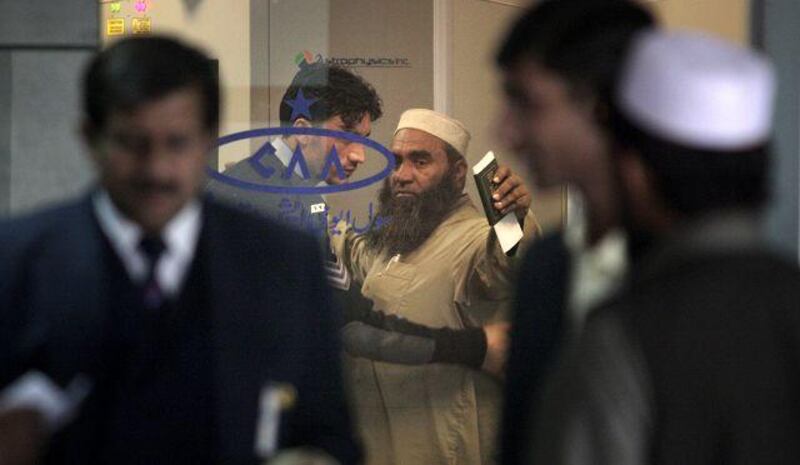WASHINGTON // Stricter security measures for US-bound travellers, including random searches, full body pat-downs and additional screening, have infuriated some Muslim leaders and civil liberties groups here who say they amount to profiling of Muslims and Arabs.
The Washington-based Council on American-Islamic Relations (Cair) described the new guidelines, which subject passengers travelling from 13 Muslim-majority countries to rigorous screening, as "faith-based security checks". The group said the new screening methods will disproportionately affect US Muslim citizens visiting their families abroad. "Almost every American Muslim who travels to see family or friends or goes on pilgrimage to Mecca will automatically be singled out for special security checks: that's profiling," Nihad Awad, Cair's national executive director, said in a statement, arguing that individual screening should be based on suspicious behaviour, not nationality. "While singling out travellers based on religion and national origin may make some people feel safer, it only serves to alienate and stigmatise Muslims and does nothing to improve airline security."
The guidelines "deliver a propaganda victory to al Qa'eda and other violent extremist groups, since they rob targeted groups of people of their civil liberties based on their ethnicity and country of origin", said Alejandro Beutel, government liaison for the Muslim Public Affairs Council. "Call it whatever you want, but this is religious and ethnic profiling at its worst." A spokeswoman for the US Transportation and Security Administration, Lauren Gaches, said the TSA does not engage in profiling. "As is always the case, TSA security measures are based on threat, not ethnic or religious background."
The security measures, which went into effect on Monday, are a response to the failed attempt to blow up a US-bound passenger jet on Christmas Day. The Nigerian man suspected in the attack, Abdul Farouk Abdulmutallab, was trained and equipped with an explosive device by an al Qa'eda cell in Yemen, according to US authorities. Under the new guidelines, all US-bound passengers will face stepped-up security and are subject to random searches, the TSA said. Those travelling from or through countries that the US recognises as a "state sponsor of terrorism" or as a "countries of interest" will be singled out for "enhanced screening". The US state department lists Cuba, Iran, Sudan and Syria as "state sponsors of terrorism"; Afghanistan, Algeria, Lebanon, Libya, Iraq, Nigeria, Pakistan, Saudi Arabia, Somalia and Yemen are listed as "countries of interest" by the TSA.
"Enhanced screening" could include pat-downs by inspectors, searches of carry-on bags, explosive detection technology and imaging technology, the TSA said. Airports around the world are ordering full body scanners that can detect objects beneath clothes, which experts say would have detected the explosives suspected to have been hidden in Mr Abdulmutallab's underwear. The technology, however, also has raised new privacy concerns.
Some security experts say such measures, if invasive, are nevertheless a fact of life in a post-September 11 world. John Strauchs, a Virginia-based security engineer who helped design the three major airports in New York City and Ben Gurion International Airport in Israel, said such profiling was "unavoidable". "Any beat cop that walks the streets knows what to look for on his or her beat, who the troublemakers are, what they look like, and so forth," he said.
He noted that the current screening procedures resembled those aimed at Hispanic Americans in the early 1970s, when skyjackers targeted flights between the United States and Cuba. "If you had a goatee or a beard and looked like Che Guevara, you were scrutinised closely because those were the kinds of people who were doing the skyjacking at that time," he said. "It's no different." Still, he said, profiling based on nationality and similar criteria is not going to make the United States or any country safer. If inspectors step up profiling of passengers from countries known to have harboured terrorists, he said, al Qa'eda and other groups will "simply recruit people from countries that are not terror prone".
"We need to use the correct technology and screen all passengers regardless of their origin," added Douglas Laird, who served as security director for Northwest Airlines for 15 years. Critics say that the alleged "shoe bomber", Richard Reid, is a British citizen, as were four of the attackers who detonated backpack bombs on London subways in 2005. Jose Padilla, suspected of plotting to detonate a radioactive "dirty bomb" in the United States, is Hispanic American.
The American Civil Liberties Union called the enhanced screening of citizens from certain countries "bad policy" that "violates American values". "We should be focusing on evidence-based, targeted and narrowly tailored investigations based on individualised suspicion," said Michael German, the national security policy counsel with the ACLU's Washington Legislative Office and a former FBI agent. Barack Obama, the US president, was scheduled to meet yesterday his top advisers to discuss ongoing reviews of screening procedures and the US watch list system, which the government uses to identify known and suspected terrorists and prevent their entry into the United States.
Bill Burton, the deputy White House press secretary, said on Monday that dozens of names were added to the TSA's no-fly list since the Christmas Day bombing attempt. At the meeting, the president was expected to receive an update on the investigation into that incident and briefings on the security status of various government agencies, from energy to homeland security. Hillary Clinton, the secretary of state, Eric Holder, the attorney general, Robert Gates, the defence secretary, Leon Panetta, the CIA director, and Robert Mueller, the director of the FBI, were among the 20 officials expected to attend.
@Email:sstanek@thenational.ae






